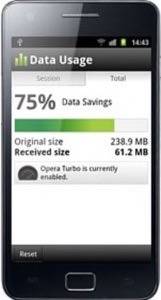Mobile browser Opera announced today new versions of its Android browser with new features that will help users control the amount of data they use while surfing the mobile Web. Opera Mobile 11.5 and Mini 6.5 uses cloud technology to reduce the size of Web pages by up to 90% and is another entry into the trend of using the cloud to offload data traffic, something the new Amazon Kindle Fire tablet will do with its “Silk” browser.

Opera will show you exactly how much data you have used and how much you have saved with a dedicated page in the browser. The goal is to help users save money on pay-as-you-go data plans. It can also be helpful to the millions of users who face data caps and throttling coming from the carriers. Check out the video of Opera’s new Android browser below.
Tying the browser to the cloud is an innovating concept. It also could be a touch controversial. If companies are tracking browsing in the cloud, they inherently have a stored record of everything that a user has ever done within that browser. That is the criticism that has been levied at Silk though it is unclear how Opera is using the data that it accumulates. Ostensibly, Opera is offloading user data from the mobile Web to the cloud, saving users megabytes along the way.

Opera Mini works with 3,000 devices. The new versions also bring updates to Opera Turbo, the browser’s feature to speed up sites while browsing on a data plan or a slow connection. Opera Mobile also now supports inline video for Android Honeycomb tablets. The rendering engine, Opera Presto, has been updated to improve network performance especially when viewing content from Javascript and HTML5 sites.
Opera’s focus on data is unique in the mobile browser world. The discussion is still open on what the company does with its data but Opera is a good example of how the extended Android community is pushing the bounds of what mobile browsers can do. The most data efficient mobile browsers have historically belonged to Research In Motion’s BlackBerry devices. The only problem with RIM is that the browsing experience on its smartphones is second-rate in comparison to the iPhone and Android devices.
What is your favorite third-party Android browser?
Check out the video and let us know in the comments if what Opera has cooked up is what users need from a mobile browser.









